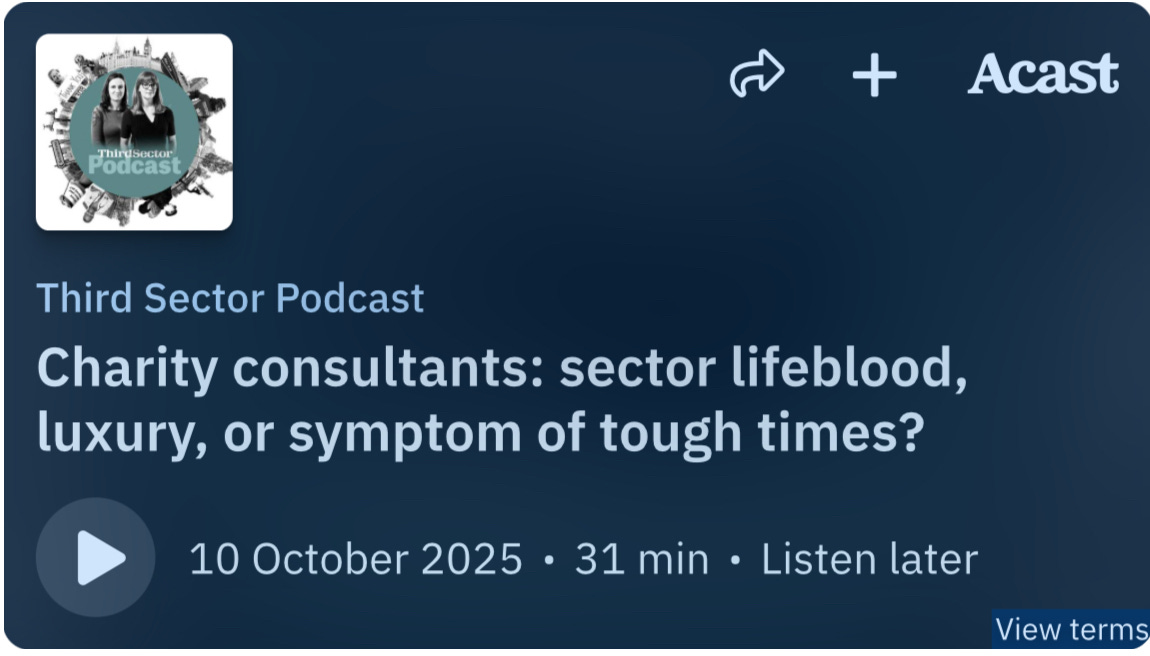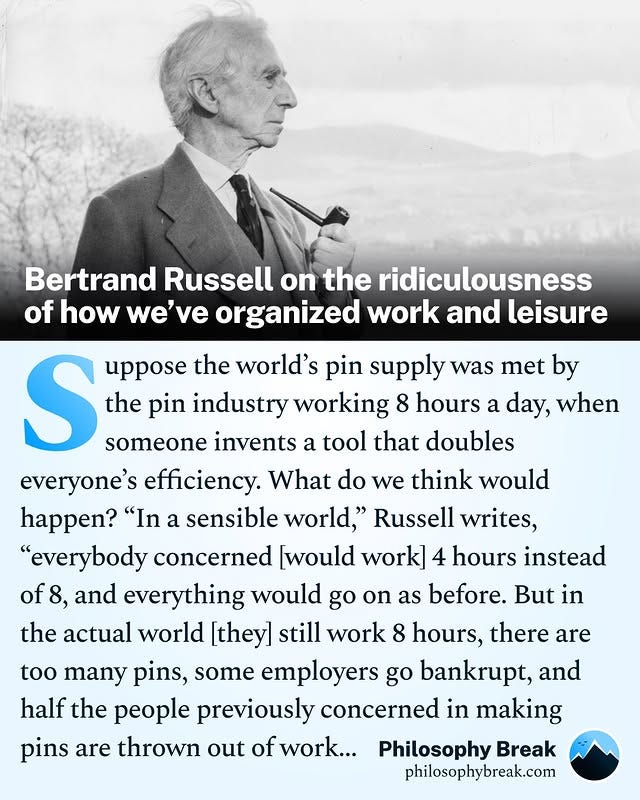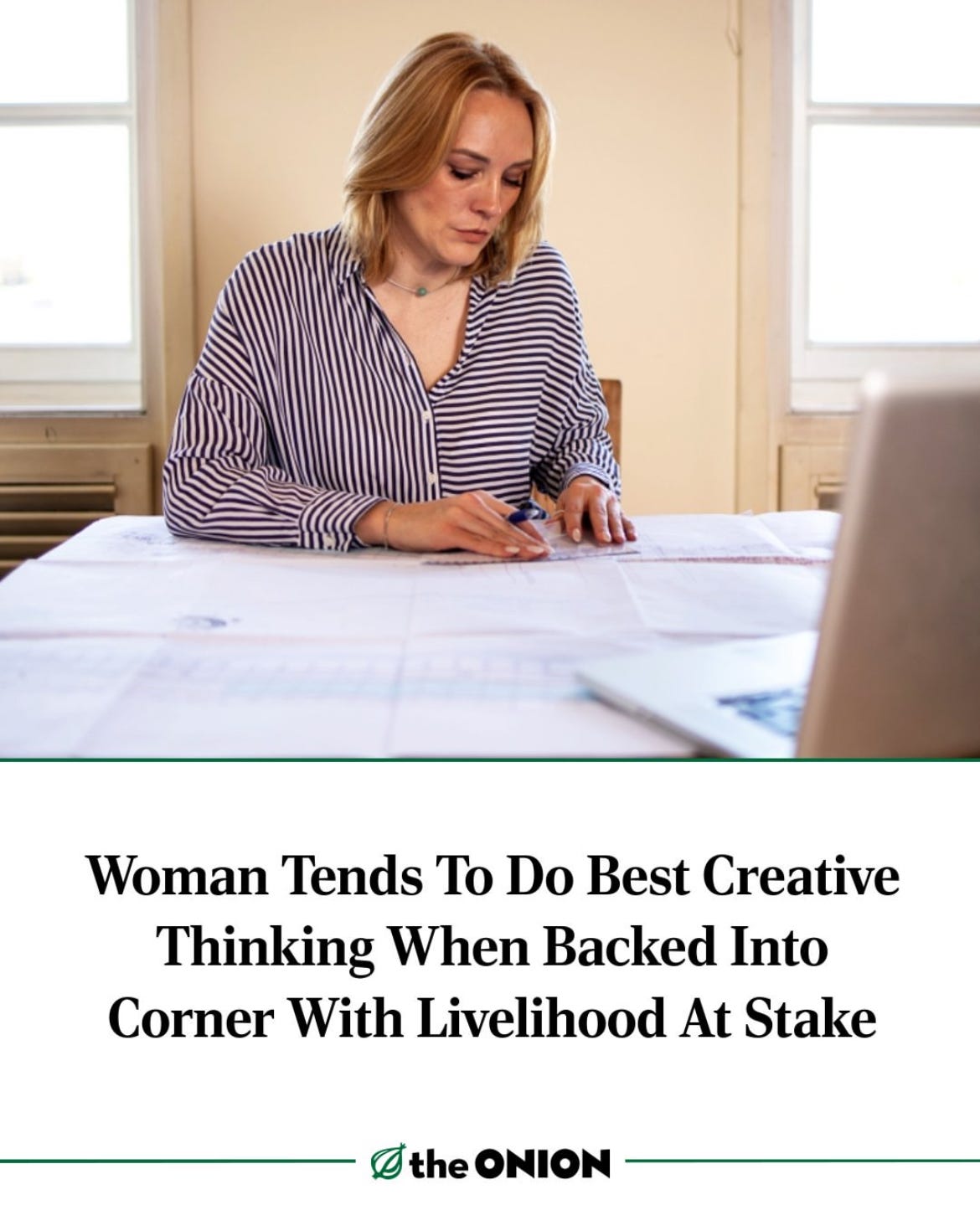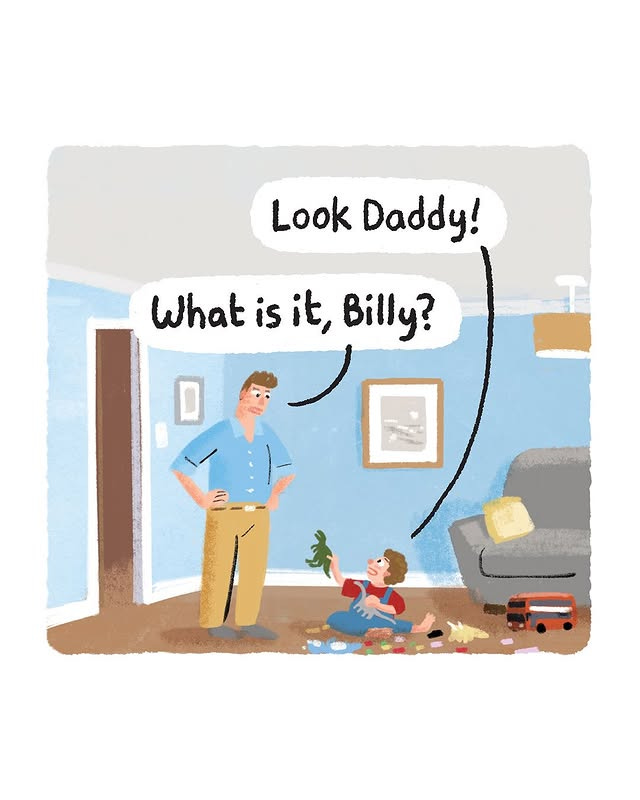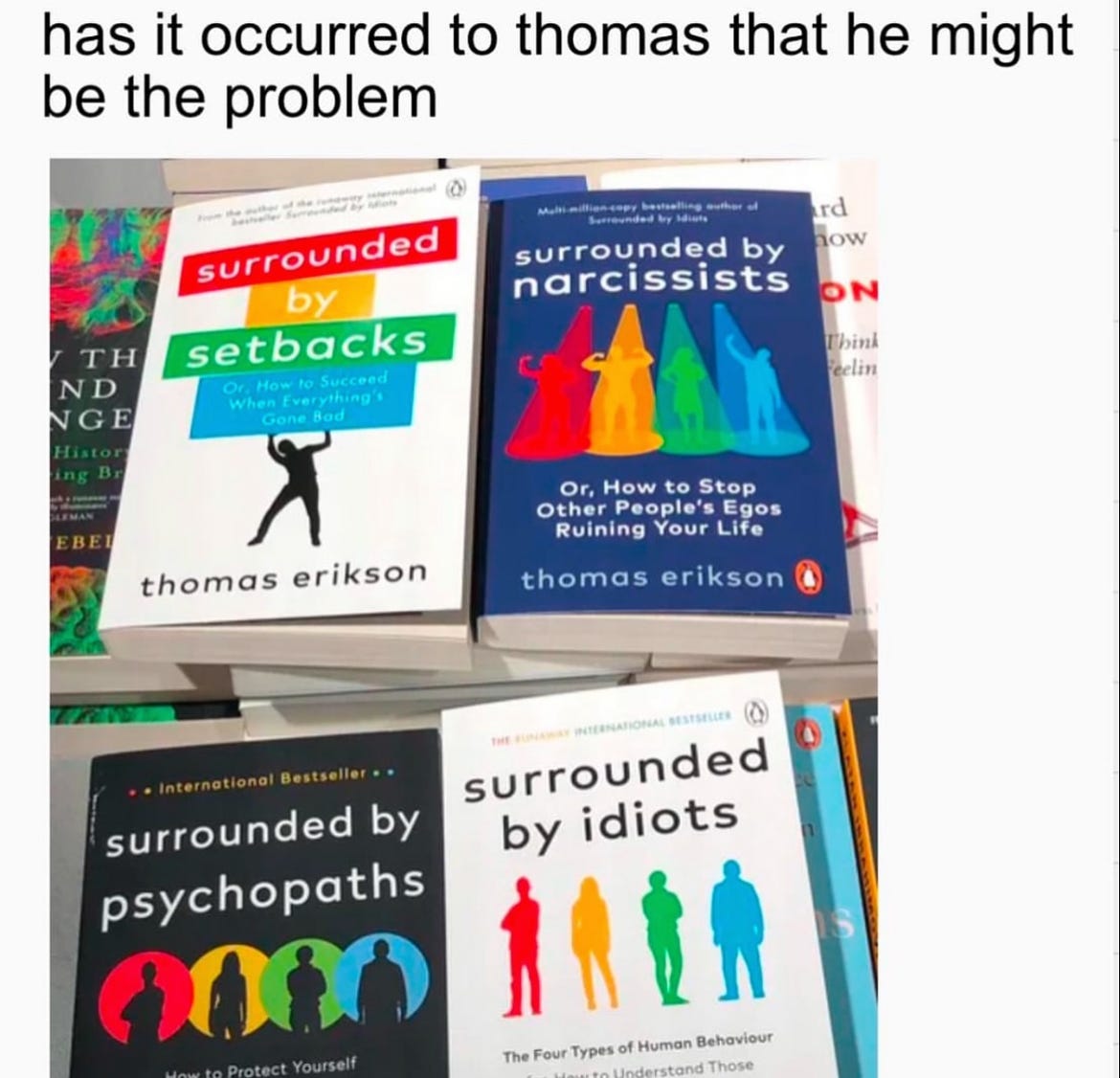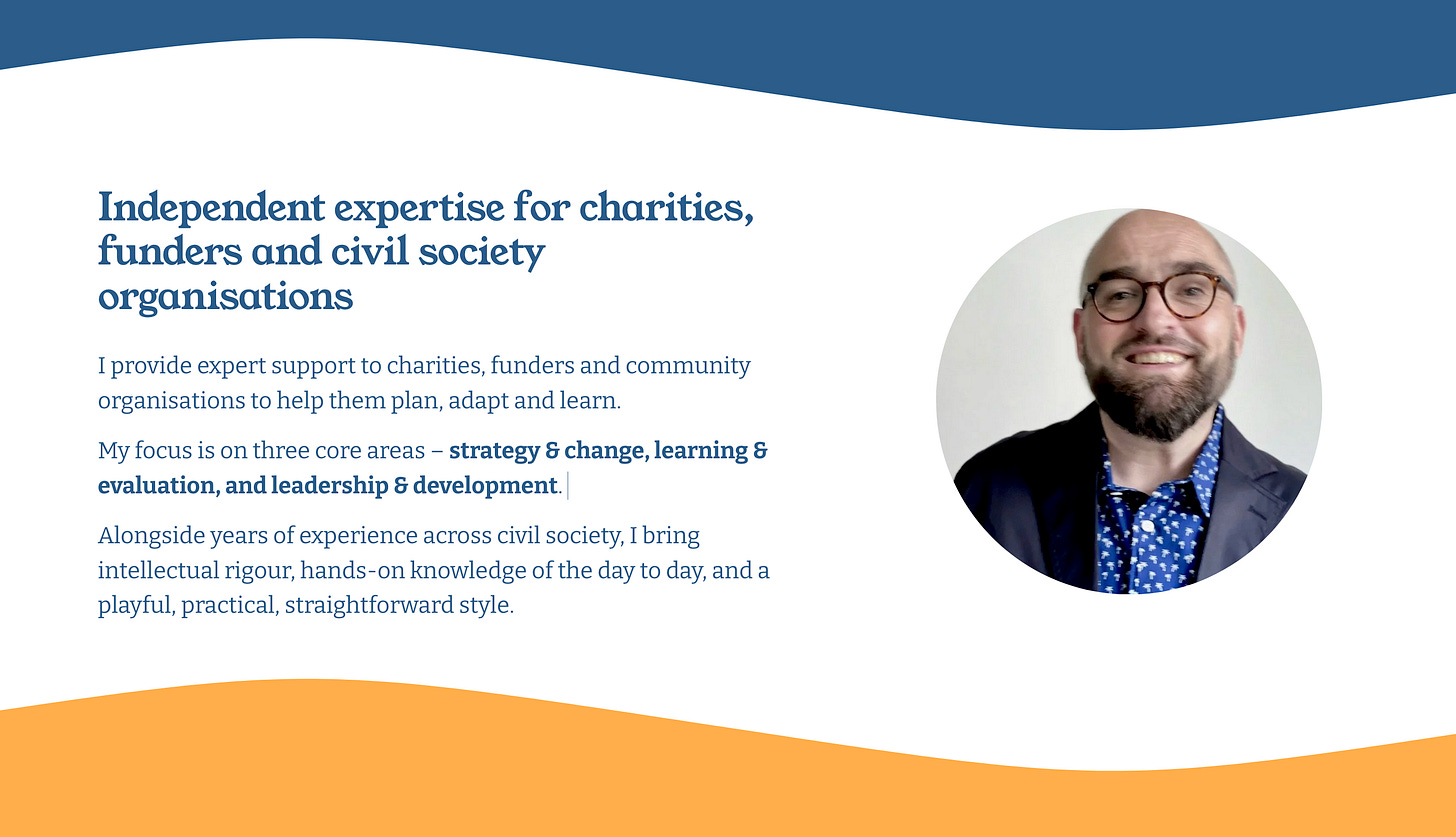The new non-profit precariat: what’s with all the freelancers?
How should we feel about the rise of charity freelancing? How should we approach 'labour' in the voluntary sector?

Welcome, all four readers and a dog, to the latest issue of Barely Civil Society. This time, I talk about the rise of charity freelancers in the UK and to what extent this is to be welcomed or otherwise. As ever, I’m looking into the wider historical, political and economic trends that are shaping this, both inside, and beyond, this particular industry.
BTW If you’re looking for the funny personal bit, it’s now at the end.
Thanks to all the people who got in touch this week to tell me their stories - I’m glad that the podcast gave a voice to some people who have had experiences that don’t tally with the success stories we’re often fed on Linkedin.
Work work work
It’s become fairly undeniable that swathes of redundancies have taken place in the UK’s voluntary sector over the last couple of years, particularly in the mid-to-senior management level. This seems to be one of the reasons we’re seeing significant increases in the number of freelancers in the sector. Beyond the specifics of freelancing, which, as I’ve said elsewhere, increases the precarity of skilled and ‘professional’ workers, we’re seeing a hollowing out of management and senior roles as a whole, especially in specific skills.
What we’re watching in the voluntary sector mirrors patterns across the wider economy: the disappearance of mid-level roles, the rise of short-term contracts, and the quiet normalisation of insecurity as the price of ‘flexibility’. As ever, I’m not so interested in the ‘inside baseball’ trade talk. I’m much more interested in how this maps to wider changes in our society, economy, and culture. For some time, there has been a hollowing out of middle incomes in the West - people in clerical, skilled manufacturing jobs. In the VCS this seems to be expanding further up the tree and into senior roles. I think we are canaries in the mineshaft of the next recession (or even crash) likely to engulf the wider economy before long.
What’s happening in the VCS?
In the Third Sector podcast, we were looking at a survey by freelancer network, Blume undertaken by Jenny Raschbauer. The top line figures showed that very few freelancers would want to return to F/T permanent employment (7%). But also that many had not really chosen their current situation. There’s also a certain amount of survivor bias in that survey, I suppose. You’re much less likely to complete it if freelancing didn’t work out for you. Either you’re not doing it any more, or the last thing you want is to tell anyone about it. (Of course, some will choose to do so because of the strength of negative feeling too - and there was some of that in the raw data…)
The survey data gives a snapshot of this tension between choice and necessity: and shows that an apparent boom in autonomy can disguise a collapse in security. So, while some are starting out on ‘an exciting and enterprising new chapter’ (as the Linkedin posts always say...), at least 20% of them are coming from redundancy, the survey shows. Or horribly toxic workplaces. And there’s always a danger that we welcome a new flexibility without noticing that much of this is a result of massive sector contraction. Some people are finding that there is no longer an alternative, as restricted funding, refusal to pay for management costs, and wider cuts risk creating a new precariat where managers/ specialists used to have job security. Others - especially fundraisers & CEOs - are fleeing toxic burnout cultures.
Add to this that many others find they have to freelance because of childcare, health needs, and so on. The constant refrain was of women especially having to do freelance work in order to given them time and flexibility for childcare. This is obviously part of the pregnancy pay gap. But alongside that, there is the fact that those who are able to freelance - who have this as a choice - are more likely to have things like a stable second income from a partner, or a financial cushion.1 (I’m not talking about the fabulously wealthy here - remember that many people have no more than even a single month of income in savings and live paycheque to paycheque. Often we don’t realise just how bad things can be, and how often they are.) So class plays into this heavily too - also, of course, in the skills we are able to accrue, the networks we have (this, I think, is perhaps the biggest driver, and so dependent on professional class-based skills and culture).
So, while some, (like me, this week, mostly) enjoy this work, others would find anything but permanent stable employment not only anxious, but dangerous. Let’s be clear: the fear never goes away. Uncertainty and fear was a universal negative in the Blume survey.
To understand what’s happening, it helps to zoom out: the new freelance precariat in the charity sector isn’t an isolated phenomenon. It seems to me to sit within a much broader story about the decline of the post-war middle class.
The hollowing out of the middle classes
The US consultancy firm, McKinsey, categorises ‘independent’ workers into four types: Free Agents, Casual Earners, Reluctants, and the Financially Strapped. Our sector has all four. The first two are to be welcomed: ‘enterprising’ folks who’ve found the thing that works for them partly through skill, and partly luck.
“While demographically diverse, independent workers largely fit into four segments (exhibit): free agents, who actively choose independent work and derive their primary income from it; casual earners, who use independent work for supplemental income and do so by choice; reluctants, who make their primary living from independent work but would prefer traditional jobs; and the financially strapped, who do supplemental independent work out of necessity.”
McKinsey on Independents and the gig economy
The last two that should concern us. Across the world, the growth of the Deliveroo/ Uberised model of the gig economy is sometimes dressed up as lifestyle choice. But we know that isn’t always what’s happening. Yes, many benefit from the flexibility of self-employment. The people who don’t - but still have to do it - are the problem.
“The balance of power has shifted away from workers and towards employers – for example, the relationship between an Uber driver and Uber as a multinational corporation is deliberately designed to shift risk from company to worker – and this, along with other cost-cutting practices that have reduced labour’s negotiating power, is one of the reasons why the ratio of profits to wages has reached a record high in the last decade. Others live hand to mouth on zero-hour contracts.”
- ‘Mission Economy: A Moonshot Guide to Changing Capitalism’, Mariana Mazzucato.
The new precarious middle classes have been the subject of concern for commentators and economists for some time. And it is likely that this sense of increased anxiety and middle class precarity adds to the rise of voting for right wing parties in groups who might normally find them rather too déclassé. When you lose a property owning middle class, more and more of that wealth is sucked up to the super-wealthy. Economists and popular economic commentators like Gary Stevenson have warned about the hollowing out of the middle classes, as resources get siphoned out of the working and middle classes and into an ever-increasing share of wealth for the super-wealthy, whether corporate or individual.
Elsewhere the brilliant Barbara Ehrenreich has written about ‘Fear of Falling’ and sees that fear of losing hard-won and fleeting privileges as part of the essential experience of the modern middle classes (compare this with, for example, the past supposed solidity and unchallengability of hereditary wealth). What we’re seeing now is not the end of that class, but its transformation into something even more anxious and less secure; that is, a middle class without any of the small guarantees that started to develop for it after the Second World War.
This comes after the post-war creation of a property-owning middle class, which is one of the reasons we ended up with comparative stability and prosperity for some time. In other places, for example some parts of Europe, better controls on housing profits/ public ownership and more redistributive economics have done a better job at reducing absolute poverty as well as relative - but in the anglosphere and many other market capitalist economies, this property-owning middle class has been vital.
A recent study by the OECD shows that the middle classes, faced with stagnant incomes and rising costs, are becoming less able to save and falling into debt. We also know that home ownership is becoming less and less likely for even middle class households. Of course the ‘middle class’ is constantly shifting, and has many nooks and crannies, and levels of wealth, autonomy, power and privilege. Where it begins and ends is a constant source of debate and discussion. And many would point out that most of the people who we describe as ‘middle class’ in the UK are in actual fact, much like in the US, really ‘working class’. They may have the trappings of respectability, perhaps some savings, may (decreasingly) own their own home, or may have been to university, but as the OECD points out, all of those things are being erased. We’re seeing downward social mobility over the generations (I’ve seen this in my own family). And the fundamental of having to sell labour to those who extract profit is an economic characteristic of most ‘middle class’ experiences, until we reach the upper limits where we may find those who have invested in property, or enjoy some level of hereditary wealth.
But the point is, the middle classes have always in some ways been defined by their precarity, because that is what sets them apart from the hereditary wealth of the aristocracy who preceded them. As the bourgeoisie’s ‘new money’ solidified, many became wealthy across generations. But most, in the shape our economies and societies now, are much more precarious than our ideas tend to suggest.
Those who set up businesses and extract profit from the labour of others often tend to see themselves as somehow more independent, or as members of a different class than the ‘working class’: you make money from other people’s work, not your own’ as the saying goes. But remember that the majority of people who own small businesses are not making a ‘profit’ - they are making a living. The dream of becoming some business magnate who extracts profit from the labour of many others and reinvests this into more profit-making is not universally held, and certainly, not universally real.
Even more so for the self-employed. While we appear to have a high level of independence, our need to continue to sell our labour even with control over whether we supply or withdraw it, means we are highly and directly reliant on markets and purchasers. The idea that we are employed by ‘ourselves’ is often not really the case. We still sell our labour for the profit of others. We just choose who we sell it to, and can up sticks when we want to. Are we working class or middle class, petit-bourgeois, or bourgeois? It all depends on where you draw lines - and of course, the lines are not really lines so much as axes, or forces. Our power changes over history.
Freelancers and the Black Death: an aside
This tension between worker dependence and autonomy runs pretty deep, and I think that’s why talk about freelancers often turns into ad hominem critiques about their supposed greed or lack of scruple. Some in the Blume survey noticed what I did, that there is an assumption that freelancers are trying to inflate their work, or their price, or get away with something, or don’t feel a sense of allegiance to their cause. In the podcast I talk about people’s ludicrous objections to day rates - usually because they don’t know the first thing about any kind of business.
So why do people treat freelancers with a deep level of distrust? Well, first of all because they often can. As I said in the podcast, I see a lot of projection of anxieties about paying people fairly for their work in the non-profit sector onto those who have to ask (invoice) for money regularly, rather than just having to await a monthly bank transfer. But there is often something beyond that: a level of disdain.
The thing is, freelancing and self-employment has always unsettled long-standing expectations about loyalty, hierarchy, and control for employers. We seem like dangerous, anti-social lone wolves. We might be hard to control. Nobody ‘owns’ us.
Some of this is no doubt simply because of the dynamic itself: you’re an outsider and easy to exploit, or, in some situations, expected to exploit. (I have often said that the difference between a freelancer and a consultants is: a freelancer is someone you think you can exploit; a consultant is someone you think is going to exploit you…)
But I sometimes wonder if this is woven into our culture more deeply. After the Black Death, with at least a third of Europe’s population dead, the feudal system was in disarray. Serfs were given leave to remain on the land of feudal lords (erm, hence landlords), to till the soil, and give up the larger portion of what they grew as payment, in return for protection (when it suited….). Suddenly, with a massively reduced workforce, peasant workers found that they were in high demand. Whereas in the past they would remain where they were and ‘pledge fielty’ to the lord and the land, some realised they could demand better deals in other places by moving around. All the bargaining power made them unpopular.
This struck landlords as a bloody cheek because they had been generously terrorising and exploiting these serfs for a centuries, and now these scrubbers thought they could just go off and sell their labour to anybody they fancied. Somthing had to be done.
Soon, any slutty roaming peasants hoeing around with anybody who paid them were controlled by the Statute of Labourers (1351). This introduced wage controls, restrictions on movement, compulsory work, and price controls on food and goods. Labourers still moved around, and employers broke the rules when it suited them, but it marked an important moment in the history of capitalism: it was one of the first legal attempts to regulate the labour market, to turn ‘free’ peasants into an immobile workforce because suddenly there was an element of choice. The goal was to manage and win class conflict, between the labourers, and those who controlled and exploited their labour.
Deep down, ‘employers’ have many elements remaining of the feudal landlords. They expect a great deal of loyalty, and often express a desire to control all aspects of what we can say, do, and think. (They can tell you when you can go to the toilet, or fire you for speaking ill of your ‘lord’.) What changes over time is the extent to which lords feel like they have reciprocal responsibility to their labourers - and what the role of central government (and welfare/ charity) is in those relationships.
As we have developed our economy and society over time, we have constantly batted it back and forth. There’s the desire for a self-reliant labouring class to whom lords have no responsibility beyond the immediate provision of labour - and who therefore retain a level of self-determination and independence. And then there is the demand for a workforce who are reliant on those lords, and indeed, might show deference to them. Of course, the main goal of neoliberal capitalist wage and labour relations post Thatcher has been to create a relationship of total reliance by workers on the employer and zero responsibility from the employer to the worker. The battle continues.
Anyway, it’s worth bearing in mind that when a potential buyer talks about freelancers or consultants as greedy, thieving, disloyal parasites, they are just parroting the same ideas feudal landlords had in the 14th century. And indeed, there is likely to be some deep-down cultural continuity in those ideas, even in a sector that likes to think of itself as above the moral fray of economic extraction. (As if! Much more to say here….)
Back to charities
Now you might say: charities don’t make a profit, so this isn’t relevant. Well, yes and no. Charity culture is not immune from wider economic ideology. We see all of the charitable funders who flatly refuse to pay for management costs. Fund your CEO? Ha! Pay for a senior manager? Double ha!
This hostility to paying for ‘management’ isn’t just about efficient budgeting. It’s an ideological stance that sees professional labour as wasteful or self-serving, while idealising low-paid or unpaid labour as virtuous. You can see funders’ determination that management posts will not be funded as an expression of wealth privilege and its ideology: that the middle classes and professionals are not to be valued. And indeed, historically, the middle classes have been seen as a threat to class systems and to the privilege of the wealthiest. They tend to vote, for example. And, indeed, given that the middle class has long been the greatest competitor for wealth and resources, and there has long been a battle within the charity sector over which elite is in charge (the priests, the aristocracy, the merchants, the bourgeoisie or the political elite), you are likely to find these ideas and practices leaking over into our perceptions and practices.
That may hang heavy over the ideas of a sector driven by a battle between the managerial classes and the ultra rich who drive and guide giving (whether directly through their giving, or through the ideology that the bourgeois elites who often steer trustee boards mimic). Once you see it this way, the sector’s funding patterns and refusal to fund managers look less like neutral financial decisions and more like a reproduction of class hierarchy and ideology.
So, if the origin is cultural and ideological, the end point is economic. Again, it serves to hollow out professional labour, and drive wages to the bottom. It also leaves us without people with the skills to challenge those ideologies and the power of the funders who hold the power over charitable delivery, and industrial conditions, through their wealth: in many cases, directly representing massive capital of either private or corporate/ shareholder origin (at differing levels of remove and control).
This goes far beyond the idea of casualisation and freelancers, but now if you take it to the stage where there is no funding for permanent or lasting employees in senior roles, the only way for charities to get people into those roles is by outsourcing the task to others and through casualisation. This also ‘hides’ the work to an extent. But it transfers precarity to some who would previously have had stability and employment rights, as well as the responsibility for cost cutting, and managing impossible systems set up by funders, to charities.
We’re seeing the precarity long expected of workers at the bottom of the pile being expanded and extended further and further up the tree in terms of employment and earning. Youth workers and care workers on sessional rates? Not a problem! They love it. It’s better than Tesco, what are they complaining about? Don’t they care about the people we work with? Managers? Hold on a minute…
Overall, within the charity sector and without, the balance is complex, and a matter of ongoing conflict and change. It is in many ways this is the sharp end of class conflict. And the gender and class lines in the charity world are deeply knitted into this changing picture of how we do, and pay, work in the deeply class-riddled world of the charity sector. (A sector where a deeply enculturated class system sometimes shows itself more overtly than in sectors more directly opened to the ravages of neoliberal profit incentives.)
So we end up with a sector where the work once done by stable employees is dispersed across freelancers and temporary contracts (I didn’t have a permanent contract once until I first became a CEO), without anyone addressing the structural problem beneath it: the collapse of financial security itself for all but those with wealth. Yes, in the charity industry, but far beyond that, to our whole changing economy.
Enterprise and UBI
Now, none of this is just to sing the praises of employment. Much as there are moments I want to drop the consultancy game (when there’s no work, duh…), there are many things to be said for individual or even small enterprise. And not just for our personal experience/ lifestyle, but for society: enterprise and small businesses are pretty fantastic drivers of innovation and creativity. Alongside a tendency to unseat our human relationships and concentrate profits at the top, market capitalism tends to kill small business and enterprise. That’s bad for everyone.
And weirdly, I have always admired the Enterprise Allowance scheme run by Thatcher’s Government, which was strikingly effective in some ways (probably not those that Thatcher intended). Not only were there many new artists, creatives, and all sorts of interesting self employed people and business created. It also gave people who otherwise would never have the access to start up capital a chance to make a business happen. Let’s think about this: that lack of a cushion and any chance to invest is indeed the kind of thing that perpetuates the class system.
Complaints (as you often see about EA programme) that up to one in six businesses failed in the first year seem bonkers. Surely at least one in six businesses fail in the first year anyway? And what does ‘fail’ mean? And I thought a survival of the fittest economy was what we are all about? Isn’t this the glorious logic of the market?
So I was very interested to discover the Irish Government is introducing a scheme providing £325 week as a basic income for artists. Let’s face it, with the rise of AI and so on they are in even greater trouble than they have been for some time in an economy that values bulk and ‘content’ over art or craft. Providing this opportunity has a chance to open up the possibility of self-employment and enterprise in creative industries in ways that would otherwise be off the scale unachievable for anyone without rich parents. (We all know about this trap.)
The appeal of enterprise lies in its promise of autonomy, but it risks recreating the same inequalities unless there’s some shared foundation of security beneath it. And what this brings us to is the idea of universal basic income.2
UBI is perhaps one of the most potentially powerful ideas for the ‘charity’ or nonprofit sector that exists on the left today.3 That’s partly because it may improve the lot of the people we work with. It’s also of massive significance to volunteering - it would open up the potential for all to become an active part of a caring society. They might even have the time to care for their own families and friends!
And the overlap with volunteering and what we call ‘freelance’ and consultants in the sector is signficant. Not least, many of us will have seen wealthy professionals from other sectors volunteering to do the work we might be paid for, for free. (They do it badly, it’s not worth worrying about.)
But the point overall is that if we looked more to models like UBI, the ability for people to balance childcare/ health, lifestyle, earning, and contributing to a cause or something they care about would potentially be greatly increased. Match this with the potential for seeking investment for business ideas, and there is significant potential for the development of an enterprise culture not based on financial profit, but on social profit.
If this seems a sidestep, well, yes, it is. But my point is that with many of us choosing to do this work in a way that allows us to exercise creativity, freedom, and contribution to cause, retaining independence and driving enterprise, while at the same time making this more equitable and accessible, could be a massive benefit to the civil society we work in. In a way, this brings the argument full circle. The pressures driving freelancing and precarity are the same ones that make ideas like UBI so compelling: a search for ways to reclaim agency, stability, and meaning in work without returning to old hierarchies - especially as AI and technological developments threaten many of the entry level professional jobs which have developed since the rise of bureaucracy.
In the meantime, balancing complex conflicts in a labour market rapidly contracting in the centre, and having to do ‘more with less,’ will remain a very tricky way to work in the charity sector, and indeed, the wider world of labour.
What are our values?
What’s at stake here isn’t just how we work, but what kind of (civil) society we’re building. Hannah Kowzun, for example, has been looking recently at how charity sector values seem not to follow through into their relationships with employees. What always worries me is that where capitalist enterprises extract profit from labour and put it into shareholder value, we extract that same profit and put it into ‘noble causes’. Exploiting employees for a good cause is not much better than doing so for your shareholders. Perhaps even less so when we are very often replacing public welfare systems that were killed to allow greater profits for private shareholders.
Of course, this doesn’t mean that all freelancing is extractive or exploiting - but the message starting to be pedalled is that greater ‘flexibility’ (precarity) is better for ‘charities’. To my mind, that’s a narrow view that fails to see how quickly we can prop up the social ills we fight against, with our very own practices.
If care, community, and social change work are only possible through financial precarity, and then only available to those best placed to weather that uncertainty, there’s a risk we’re just further institutionalising exploitation in the name of diverse ‘causes’. As well as making participation in civil society itself - a fundamental of democracy - more than ever a privilege of the better off.
What can we do?
So what can charities do? Some people don’t like it when I don’t provide ‘3 weird tricks that doctors hate’, to fix complex social and economic problems in civil society. And yet the answers are usually obvious and well-trodden.
First, funders need to give truly unrestricted funding. That way we can make it possible to hire proper staff to do the things we need, at whatever level, and whatever level of specialism, at least when there is enough money. Underinvestment is one problem; simply refusing to let people spend money in the way they need to is another. That way, if you can afford a proper senior post, you can have one.
Second, people with caring responsibilities, health issues, and so on, need flexible working. We need to continue to make this more possible. (Maybe I could have stayed in my last permanent job if they had allowed me to do more home working while I was ill.) And while this is a problem across our whole economy and society, we need to recognise we’re not immune to it in the VCS.
Thirdly, a lot of people are leaving senior jobs to be freelance because of a toxic culture of more-with-less and excessive and unreasonable demands, especially of fundraisers. That only stops with culture change, especially among leaders and trustees. Demanding fundraisers raise more as people give less is magical thinking. They are not machines or a dirty secret - they are vital partners who care about whatever cause you adopt just as much as delivery staff, if not sometimes more.
And finally, treat people who freelance with respect, dignity, and fairness. Either they’re enterprising souls who have chosen to do something risky to share their skills and balance their work. Or they may be people who have been cast aside from a labour market in free fall due to neoliberal economic policies of the last 15 years.
Most of all, do not use their precarity to exploit them. Pay reasonable, serious rates that recognise their skill, value, and their need to pay for the time they will be without work. That is how people make a living. 4Overall, you may not be able to get as good a ‘deal’ for your charity that way. But do we want to (non)profit at the expense of others?
The funny personal bit
The last couple of weeks have been especially stressful since my toilet broke. You’ve heard me say that I want to ‘smash the system’? Well, somebody misheard and instead, I just cracked the cistern.
After many attempts, I managed to get it replaced yesterday by my usual plumber. I felt weirdly guilty about how unpleasant a job it clearly was, and I felt he was judging me for having done appalling things through what is, after all, a hole in the bathroom floor for the last ten years. I’‘m sure he glared at me accusingly at one point. Anyway, the new convenience has a truly terrifying flush that booms like a crack of thunder - as if Thor himself had recently dropped a hammer. Try that at 3am.
Meanwhile, the diet continues, and it’s hard to keep food interesting when you can’t eat most of it. Yesterday, my special indulgence was buying the most beautiful pomegranate: a crimson and magenta mottled orb the size of a bowling ball, with a perfectly pursed top like a signet ring. Very beautiful, almost regal. My bag was full, so I carried it home proudly in the palm of my hand. As the bus went past, in the reflection in the window, I realised I looked like a symbol for something. ‘You looked like a Tarot card,’ said my partner.
On Saturday, for my sins, I saw the new ‘Tron: Ares’ movie. Every time I see the poster I’m convinced it’s called Tron: Arse. Turns out that would be more apposite. What a yawn. But at the other end of the culture scale, I’ve been reading George Orwell’s The Road to Wigan Pier. His personal experiences of class are complex, and he is full of the same neuroses he criticises in others, much as he is perhaps more aware of (some) of them.
But even more interesting was noticing how much time he spends frothing about working class men’s bodies. Seriously, it’s like a gay pulp novel from the 1950s; all ‘magnificent buttocks’ and proud broad shoulders glietening with sweat. I then discovered he was appallingly homophobic. Oh, George, you complete cliché.
Beyond that, what really comes across is that pretty much everybody is apparently awful except… well, George Orwell…
I fear I am reaching podcast over-exposure at this stage, as well as over-exhaustion, but have no other current celebrity appearances planned. Except, that is, for opening a branch of Poundland in Wigan, followed by a nightclub PA appearance at JAZZY NITES Danceteria. I’ll be sharing the charity DJ booth with Pudsey Bear and Katie Price.
On that note, I am considering reducing output. I’ll see you in three or four weeks, after a holiday break. I’ve written around 120,000 words in this blog in the last year. So it might be time for a slight slowing of production….
Weekly internet nonsense
The above is very interesting - a documentary explaining how despotism happens, to Americans in the 1950s. Pretty spooky stuff.
I always hate these kind of posts (above) on LinkedIn, so this is a hoot.
And finally: this one’s for Emma and Lauren.
Barely Civil Society is about making the nonprofit world braver.
Here are three ways to help.
Subscribe!
Share!
Support!
Buy me a coffee and keep me anxious and crabby. Or help me fix my toilet, which costs more than you would think.
Send me a message
The messages people send me every couple of weeks are my favourite thing. Drop me a line and say hi! What made sense to you? And what didn’t? (Be nice.)
Work with me!
Yes, I’m a freelancer/ ‘consultant’. It’s terrifying. I do
strategy & change
learning, research & evaluation
leadership training & development
I’m reasonably priced, easy to work with and have worked with organisations from £100k to £80m turnovers, including delivery charities, grantmakers and the public sector. Check out my day job webpage.
Oh and - no politics unless invited.
I also know there are many people who don’t have this and have made it work. None of the observations here are meant to reduce the achievements of anybody who manages to work freelance. But we have to be aware of the imbalances we see, and structural inequalities.
Universal inheritance, as suggested by Thomas Piketty, is another option.
Okay, get ready for this: it’s also increasing in popularity among the tech bros. For all the wrong reasons of course: a tiny pittance for the plebs which would then allow the tech giants to make all the money they want with impunity but quiet the masses. Watch this space for further, no doubt disturbing, developments.
It’s very easy to crow about discounts and our ability to squeeze people to get the best ‘deal’ if all we care about is our one single cause. But what about our wider social responsibilities? Nasty tricks like paying freelancers a standard hourly permanent rate are a particular growing issue.


